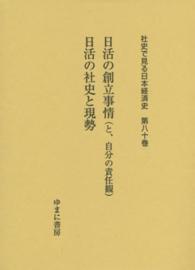- ホーム
- > 洋書
- > 英文書
- > Politics / International Relations
Full Description
In The Power of Partisanship, Joshua J. Dyck and Shanna Pearson-Merkowitz argue that the growth in partisan polarization in the United States, and the resulting negativity voters feel towards their respective opposition party, has far-reaching effects on how Americans behave both inside and outside the realm of politics. In fact, no area of social life in the United States is safe from partisan influence. As a result of changes in the media landscape and decades of political polarization, voters are stronger partisans than in the past and are more likely to view the opposition party with a combination of confusion, disdain, and outright hostility. Yet, little of this hostility is grounded in specific policy preferences. Even ideology lacks meaning in the United States: conservative and liberal are what Republicans and Democrats have labeled "conservative" and "liberal."
Dyck and Pearson-Merkowitz show how partisanship influences the electorate's support for democratic norms, willingness to engage in risk related to financial and healthcare decisions, interracial interactions, and previously non-political decisions like what we like to eat for dinner. Partisanship prevents people from learning from their interactions with friends or the realities of their neighborhoods, and even makes them oblivious to their own economic hardship. The intensity and pervasiveness of partisanship in politics today has resulted in "political knowledge" becoming an endogenous feature of strong partisanship and a poor proxy for anything but partisan behavior. Dyck and Pearson-Merkowitz present evidence that pure independents are, in fact, very responsive to information because they are not biased by partisan elite cues and important and relevant political information is often local, contextual, and personal. Drawing on a series of original surveys and experiments conducted between 2014 and 2020, Dyck and Pearson-Merkowitz show how the dominance of partisanship as a decision cue has fundamentally transformed our understanding of both political and non-political behavior.
Contents
Introduction
Chapter 1: Partisanship and Ideology in Political Decision-Making
Chapter 2: Elite Cues, Negative Partisanship, and the Changing Media Landscape
Chapter 3: Partisanship, Policy, Compromise, and the Non-political
Chapter 4: Partisanship, Race, and Intergroup Contact
Chapter 5: Prospect Theory and Partisan Cues
Chapter 6: Political Responsiveness to the Lived Experience
Chapter 7: Independents, Knowledge, and Alienation
Chapter 8: An Elite Problem Calls for an Elite Solution
Appendix







